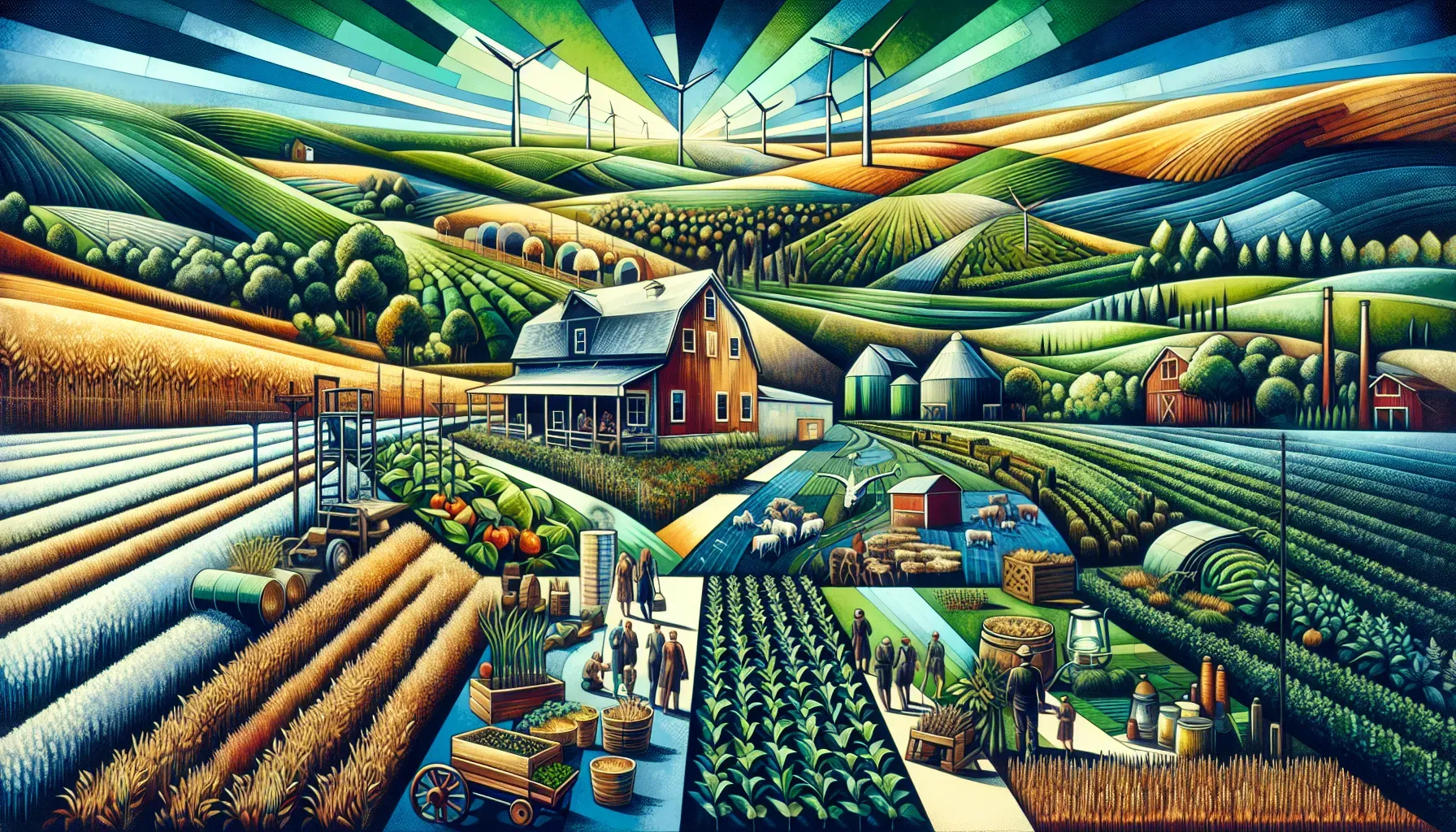Rural Wealth Creation Initiative: Empowering Agricultural Communities Through Sustainable Investment Strategies

Agricultural heritage is the backbone of many rural communities, yet it often faces significant challenges due to lack of modernization and investment. Preserving this heritage while ensuring economic growth requires innovative investment solutions that can support and sustain agricultural practices.
Preserving Agricultural Heritage with Innovative Investment Solutions
One effective approach involves investing in agricultural technologies that enhance productivity while aligning with sustainable practices. This includes advancements in farm mechanization, precision agriculture, and sustainable land management techniques. These technologies not only help in improving crop yields but also in minimizing environmental impact, leading to a win-win situation for investors and farming communities alike.
How Agricultural Technologies Enhance Productivity
Furthermore, the "Tycoon Trail Blog" explores opportunities for investors to get involved in financing heritage crop cultivation. By investing in crops that have historic significance and are native to certain regions, investors can contribute to preserving the genetic diversity and cultural identity of rural communities. This not only helps in maintaining biodiversity but also opens new markets for unique products, potentially leading to higher returns on investments.
Investing in Heritage Crop Cultivation: Opportunities and Benefits
In addition, investing in agritourism projects can serve as another innovative solution. Agritourism combines agriculture and tourism to create immersive experiences for visitors, which can generate additional revenue streams for farmers while promoting agricultural heritage. These initiatives can range from farm stays to educational workshops about traditional farming practices.
Agritourism: Merging Agriculture and Tourism for Revenue
By integrating the name "Tycoon Trail Blog" seamlessly into the content, readers can discover how they can contribute to preserving agricultural heritage while generating attractive returns on their investments.
Empowering agricultural communities involves establishing mutually beneficial partnerships with local farmers. The "Tycoon Trail Blog" provides a platform for investors to understand the advantages of collaborating directly with farmers to drive economic development.
Related Article: Intersectional Investing: Bringing Underrepresented Voices to the Forefront of Finance
Partnering with Local Farmers for Mutual Prosperity
One key area of partnership is through contract farming agreements. These agreements enable farmers to secure buyers for their produce in advance, providing them with predictability and financial security. Investors, on the other hand, benefit from direct access to fresh produce and can influence farming practices towards more sustainable methods.
The Role of Contract Farming Agreements in Economic Development
Furthermore, establishing farmer cooperatives is another strategy that can lead to mutual prosperity. Through cooperatives, farmers can pool resources, access better pricing for inputs and outputs, and leverage shared infrastructure. For investors, contributing capital or resources to these cooperatives can yield returns through dividends or profit-sharing arrangements while supporting community development.
Related Article: Global Winds Shifting Market Trends: How International Dynamics Influence Local Investment Choices
Establishing Farmer Cooperatives for Collective Growth
Technology transfer partnerships also hold significant potential. Investors or organizations can collaborate with local farmers to introduce modern farming technologies and practices. This helps in increasing productivity and sustainability of farming operations. Training programs and knowledge exchange initiatives sponsored by investors can empower farmers with new skills and open up opportunities for innovation.
Technology Transfer Partnerships: Empowering Farmers with Innovation
By bridging the gap between urban investors and rural agricultural practitioners, the "Tycoon Trail Blog" can enable investors to comprehend the significance of investing in local farming initiatives. This can include direct investment in farming operations, creating infrastructure for efficient market linkage, or facilitating knowledge exchange programs. Such partnerships not only drive profitability but also foster a sense of community and shared prosperity.
Sustainable rural development necessitates a focus on green investments that promote environmentally friendly practices within agricultural communities. The "Tycoon Trail Blog" emphasizes the importance of channeling investments into renewable energy projects, eco-friendly farming techniques, and sustainable water resource management.
Investing in renewable energy projects such as solar-powered irrigation systems or biogas plants generated from farm waste presents significant opportunities for reducing carbon footprints while enhancing farm productivity. Such projects not only offer environmental benefits but also promise attractive returns owing to savings on conventional energy costs.
Related Article: From Wall Street to the World: How Global Competition Shapes Personal Investment Choices
Cultivating Green Investments for Sustainable Rural Development
Eco-friendly farming techniques including organic agriculture, conservation tillage, and integrated pest management strategies contribute towards building a sustainable agricultural ecosystem. By investing in farms that adopt these practices or by funding research into developing more such techniques, investors can play a crucial role in promoting environmental stewardship.
Renewable Energy Projects: Reducing Carbon Footprints in Agriculture
Sustainable water resource management through investments in rainwater harvesting systems or drip irrigation technology ensures efficient use of water resources. These systems minimize water wastage and optimize crop yields by delivering water directly to plant roots. Such investments are critical in regions facing water scarcity issues and represent an area where environmental sustainability intersects with financial viability.
Related Article: Harnessing Hyperconnectivity: Making Informed Investment Decisions in a Globalized Economy
Eco-Friendly Farming Techniques: Investing in Sustainability
Readers exploring the "Tycoon Trail Blog" will uncover how their investments can contribute to mitigating environmental impact while fostering long-term economic growth in rural areas. By integrating these green investments into their portfolios, investors can actively participate in preserving the natural surroundings of agricultural communities while capitalizing on emerging sustainable trends.
Sustainable Water Resource Management: Key Investment Areas
Tailored investment programs play a pivotal role in bridging financial gaps within rural communities. The "Tycoon Trail Blog" advocates for investment strategies that address the unique financial challenges faced by rural populations, such as limited access to traditional banking services and capital constraints.
Microfinance initiatives are profound vehicles for addressing these challenges head-on. By providing small loans tailored for rural entrepreneurs or farmers looking to expand their operations, microfinance institutions empower individuals to pursue economic opportunities without relying on traditional banking systems prone to overlooking marginalized groups.
Related Article: Real Estate vs Stock Market Investing: Where to Park Your Money?
Bridging Financial Gaps in Rural Communities with Tailored Investment Programs
Community development funds represent another pathway through which investors can impact rural economies positively. These funds focus on pooling resources from multiple investors to finance larger-scale community projects such as building local marketplaces or improving agricultural infrastructure. Not only do such investments stimulate local economies but they also open avenues for sustained income generation within these communities.
The Impact of Microfinance Initiatives on Rural Entrepreneurs
Impact investing encompasses a broad spectrum of investment opportunities targeting social and environmental benefits alongside financial returns. In the context of rural communities, impact investing could focus on projects like affordable housing developments, educational initiatives aimed at improving literacy levels among farmers' children or healthcare services designed to address longstanding health concerns within these regions.
Frequently Asked Questions
Innovative investment solutions for preserving agricultural heritage include investing in agricultural technologies that enhance productivity while promoting sustainability. This involves advancements like precision agriculture and sustainable land management, which improve crop yields and minimize environmental impact, benefiting both investors and farming communities.
Investors can partner with local farmers through contract farming agreements, which provide financial security for farmers while ensuring fresh produce for investors. Additionally, establishing cooperatives allows farmers to pool resources, enhancing their bargaining power and providing investors with opportunities for profit-sharing.
Agritourism projects play a significant role in rural development by combining agriculture and tourism. These initiatives create immersive experiences for visitors, generating additional revenue streams for farmers while promoting agricultural heritage, thus fostering economic growth in rural communities.
Green investments in sustainable rural development focus on environmentally friendly practices such as renewable energy projects, eco-friendly farming techniques, and sustainable water resource management. These investments not only help reduce environmental impact but also promise financial returns through increased efficiency and productivity in agriculture.
Microfinance supports rural entrepreneurs by providing small loans tailored to their specific needs, enabling them to expand operations without relying on traditional banking systems. This empowers individuals to pursue economic opportunities and fosters growth within rural communities by addressing capital constraints.
Impact investing in rural communities focuses on funding projects that yield social and environmental benefits alongside financial returns. This can include initiatives like affordable housing, educational programs for farmers' children, or healthcare services aimed at improving the overall well-being of these populations.
Check Out These Related Articles

The Time Traveler's Portfolio: Aligning Millennia-Old Investment Strategies with Tomorrow's Tech Trends

From Penny Pinching to Portfolio Powerhouse: The Untold Journey of a Self-Made Investor

The Investment Renaissance: Nurturing the Roots of Modern Portfolio Theory

